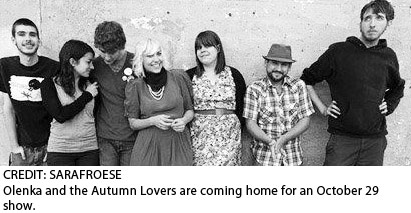Olenka and the Autumn Lovers come home

Local indie band, Olenka and the Autumn Lovers, are set to release their sophmore album, And Now We Sing. But you'll only get it once they play live in your city.
The band is releasing the album in every city they get to, until the end of the month, which means no Internet leaks — for now — or previews of tracks.
"We're being a bit silly," said frontwoman Olenka Krakus. "But we want to be able to thank (the fans). It makes it more personal in that sense. Hopefully people are okay with that."
London is the last stop on their October tour, so it has had the longest wait. The band promises it will be a party when they get back to their hometown.
"It's going to be a big one," she said, adding she hopes the community comes out to support it.
Olenka and the Autumn Lovers often feature a strong European influence in their songs, thanks to Krakus' memories of Communist Poland. Though And Now We Sing has similar influences, it does differ from their first release.
"The first album (in 2008), I was remembering folk songs my mom sang to me, I had to get my head into that headspace, the European folk scene," explained Krakus. "A lot of the melodies were centralized in that ... content."
On the new album, Odessa and Berlin fit into these moulds, but the rest of the album is more directionless.
"It's not as coherent or focused. We went all over the place with this album," she said. "I didn't feel constricted by any topics or styles or genres."
Krakus came to her band with a shortlist of over 40 songs referencing a variety of topics, but one thing that remains consistent in her songs is her love of narratives.
"A lot of singer/songwriters are reflective sort of writers," she said, adding that she often writes about characters who "live through experiences more extreme than I did."
Politics is a popular theme in her writing, along with characters facing unjust circumstances and how they come to terms with them. She has a penchant for contradictory characters, individuals listeners can sympathize with but also criticize. Some of the characters choose more successful ways of dealing with the injustices they face, while others "crash and burn."
One example of this theme is in Berlin. The character is exploring what it's like to be disappointed by the social experience around him. It takes places 20 years after the fall of the Berlin Wall. The character is reflecting on what it was like 20 years ago when the feeling was more hopeful, that the world was changing and going to be better. Now Berlin has adopted a capitalist structure, and there's still a great deal of dissatisfaction, still a lot of poor people, said Krakus.
Besides the sometimes-heavy storylines, the songs are easy to listen to, folk-y and full of different instruments from the trumpet to the glockenspiel to the saxophone. And Now We Sing is a great album to help get through the workday. It's got enough variety on it to keep the listener interested.
If you want to in check out Olenka the storyteller and her band, you can see them, with opener Kite Hill, at the Aeolian Hall on Friday, October 29 at 8:30 p.m.
"There's always some banter and some surprises," said Krakus about what to expect for the London show. "We're bringing in guest musicians (who played) on the album. It's unique and special because that won't happen regularly."
Tickets are $15 in advance and $20 at the door, and are available at Grooves, The Village Idiot, L'Atelier Grigorian and The Aeolian Hall Box Office. Visit www.olenkalovers.com for more information.













